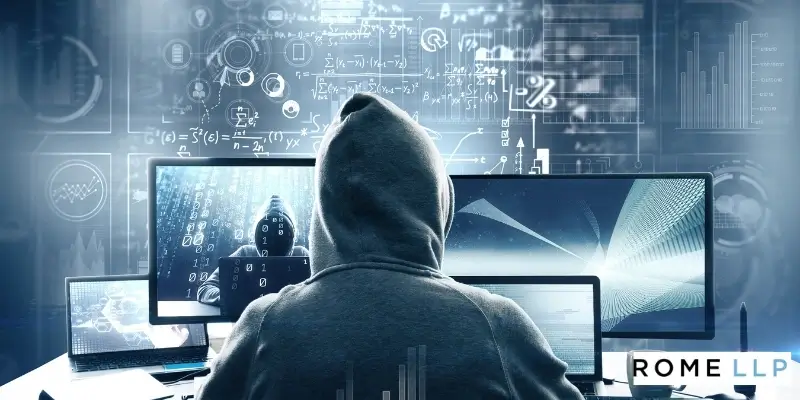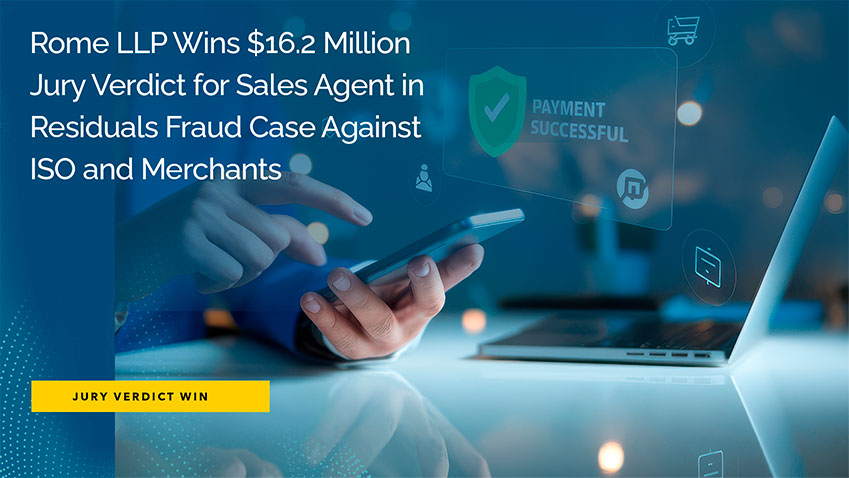Practice Area
Domain Name Litigation And Transactions Lawyer
Domain Name Litigation And Transactions Attorney
The attorneys at Rome LLP have a deep understanding of Domain Name Litigation and Transactions. Rome LLP advises businesses, registrars, registries, domain buyers/sellers, and other domain-related service providers in litigation and transactional matters.
Our attorneys have counseled numerous clients in cutting-edge matters in both the U.S. and internationally in connection with issues related to domain name disputes, as well as acquisition, protection, recovery, and management. Our attorneys have significant experience in litigating and providing analysis on complex cross-jurisdictional domain matters as well as in providing strategic advice in business matters, including monetization and security of domains and IP protection. Litigated matters have included disputes over a single domain as well as much larger disputes concerning portfolios containing millions of domain names and disputes between sizeable domain name companies, including registrars, registries, and monetization companies.
For our registrar clients, we have successfully defended countless claims of direct and contributory trademark infringement, copyright infringement, and defamation, successfully invoking safe harbors provided under the Digital Millennium Copyright Act (DMCA), the Communications Decency Act (CDA), anti-Strategic Lawsuits Against Public Participation (SLAPP) laws and, in matters of first impression, applied various new statutes to shield registrars from liability. In regulatory matters, we have litigated accreditation issues and have prosecuted arbitrations on behalf of registrars and against the Internet Corporation for Assigned Names and Numbers (ICANN).
In transactional matters involving registrars, we have handled all forms of ICANN-accreditation issues. We have counseled registrars and registries through bulk transfers and partial-bulk transfers under Bulk Transfer After Partial Portfolio Acquisition (BTAPPA) protocols. Our lawyers have also negotiated complex portfolio management transactions, managing both private and regulatory issues.
For our registry clients, we have counseled and spearheaded extension application efforts, extension buy-outs, and contested proceedings, and advised on domain extension auction matters.
Registrar and Registry Representation
The attorneys at Rome LLP have represented a number of domain name registrars in a myriad of matters over the last two decades. Registrar representation requires a deep understanding of a number of considerations including the accreditation issues as promulgated by ICANN; registrant privacy issues, both domestic and abroad; obligations under the General Data Protection Regulation (GDPR); and obligations in responding to inquiries from domestic and foreign law enforcement agencies. Each of these matters requires an experience-driven assessment of legal obligations as well as business considerations implicit in the operation of a registrar or registry.
Registrar and Registry Legal Agreements
The attorneys at Rome LLP have drafted numerous agreements that govern and address: how our clients’ websites are to be used, transactions and sales through the website, and how personal information submitted to the website will be managed and protected. At a minimum, these contracts should consist of an online privacy policy and Terms of Use (also known as “Terms and Conditions” or “Terms of Service”).
A privacy policy is legally required for all e-commerce websites and e-commerce mobile applications and notifies visitors about how the company will collect, use, disclose, share, and store their personal information (including financial information). The Terms of Use, on the other hand, will typically provide a framework of legal terms for any transactions conducted through your website. For this reason, it is imperative that online businesses adopt written terms that are pertinent to their business. Businesses that neglect to transcribe their business transactions into their Terms of Use, or that copy existing agreements without any modification, open themselves up to liability from insufficient agreements or a lack of understanding of the terms that they have adopted.
The lawyers at Rome LLP have represented a multitude of registrars and registries in connection with business expansion; litigation; underwriting and compliance; ICANN accreditation disputes and a litany of other matters unique to domain administrators and vendors.
Domain Name Litigation Results
- In Verisign v. XYZ, LLC, et al., our attorneys successfully represented the administrator of the .XYZ extension and CentralNic, a public domain registry, in a tortious interference action brought by Verisign, by reaching a favorable settlement for our clients following strategic resolution of key issues at the pleading stage.
- In representing our client Namecheap, we initiated an action against 46 domain names and domain name registrants that were infringing on Namecheap’s trademarks. Our attorneys obtained a $1.3 million judgment on behalf of Namecheap as well an injunction prohibiting further infringement and ordering the transfer of the offending domains to Namecheap.
- In a seminal case, SolidHost, N.L. v. Namecheap, Inc., our lawyers defended a domain registrar and private registration service against third-party beneficiary claims brought under the ICANN Registrar Accreditation Agreement. In a precedent-setting decision, our lawyers persuaded the court to limit the direct liability of an anonymous registration service provider for violations of the Anti-cybersquatting Consumer Protection Act (ACPA) and thus restrict the claims against our client.
- In Facebook et al., v. Namecheap, et al., Rome LLP represented Namecheap in a complex contributory infringement case concerning several thousand domain names contented to be infringing of Facebook (Meta), WhatsApp and Instagram marks. After protracted litigation, including a 9th Circuit Interlocutory Appeal, the case was resolved.
- In 2018, following a highly contested series of hearings, the lawyers at Rome LLP procured a very rare remedy for his longstanding domain name registrar client, Namecheap, Inc. Specifically, the Rome LLP team persuaded a Seattle Court to issue a mandatory preliminary injunction ordering the transfer of some 2.8 million domain names from a competing registrar to Namecheap under the BTAPPA protocol. Rome LLP attorneys proceeded to defend the ruling at the appellate level. https://domainnamewire.com/2017/12/21/court-orders-tucows-transfer-3-2-million-domains-namecheap. The case has resulted in extensive industry coverage and served to propel Namecheap into its present status as the second-largest retail domain name registrar in the world.
- Rome LLP lawyers have also handled matters of first impression, such as the representation of Scott Florcsk in a case brought by Unstoppable Domains, a blockchain-domains company, in connection with the TLD, .wallet
Blockchain Litigation and NFT Domains
An NFT domain, also known as a blockchain domain, is a type of digital asset that combines elements of blockchain technology and domain name systems. Unlike traditional domain names that use standard extensions like .com or .org, NFT domains are minted as non-fungible tokens (NFTs) on a blockchain network.
With NFT domains, users can own and control unique digital assets that represent their domain names. NFT domains are part of a growing movement towards Web 3.0, where users have greater control and ownership over their digital assets.
Owning an NFT domain grants users the ability to use and transfer it across various blockchain applications, including websites, decentralized apps (dApps), and cryptocurrency wallets. Additionally, NFT domains offer advantages such as easier integration with cryptocurrency payments, increased security, and immunity to traditional domain censorship.
As the blockchain ecosystem continues to evolve, NFT domains are gaining popularity as a novel way for users to uniquely identify themselves in the digital space while benefiting from the enhanced features of blockchain technology.
The attorneys at Rome LLP have significant experience with advising and litigating disputes involving blockchain technologies and specifically blockchain / NFT domains.
Cybersquatting
Cybersquatting is a form of cybercrime where the perpetrator buys or registers a domain name that is identical or similar to an existing domain with the intention of profiting from a recognizable trademark, company name, or personal name. Crucially, the act is illegal because of the bad faith intent of the squatter. Due to its nature, domain squatting can be considered a form of trademark infringement, though there are differences between the two. There are several types of cybersquatting, and attacks may be carried out with different goals in mind.
In many cases, squatters register domains with the intention of later selling them to established businesses or brand owners for a significant profit. However, some cybersquatters are more malicious and engage in web squatting with more nefarious intent. For example, they may use similar domains to create phishing pages, scams, or even fake surveys to collect user data, and/or convince visitors to download and launch malware on their computers.
Cybersquatting can have wide-ranging implications for legitimate businesses. It can result in fraud, data breaches, and damage to their public reputations.
What is Cybersquatting?
In its simplest form, cybersquatting is the act of buying or registering domain names with the specific intent of profiting off a trademark owned by another person. Technically, all types of cybersquatting are illegal. However, there are some cases in which the alleged crime is unintentional and therefore, not illegal
To deal with a case of cybersquatting, a company or trademark owner may choose to engage with the squatter and pay them off to take control of the domain name. However, because there are now also certain legislative instruments in place, it is also possible to build a case against the squatter and prosecute the crime.
To build a case, the onus is on the claimant to prove that a case of illegal web squatting has occurred. To do this, must generally offer evidence that:
- The name—or trademark—is well-known and diluted by the domain squatting.
- The squatter created the domain name with the intent of infringing on the rights of—and profiting off—the existing company, individual, or trademark owner.
- The domain of the web squatting site is identical or similar to an existing name or trademark.
Anti-cybersquatting legislation
There are several statutes that protect businesses and individuals against web squatting. Although many of them offer protection only within the United States, some offer international protection as well.
Anti-cybersquatting Consumer Protection Act (ACPA) of 1999
This is an American federal law that protects trademark owners and private citizens from all types of cybersquatting. Under the ACPA, it is illegal to buy or register a trademarked or personal name owned by another individual. The prohibition extends to domain names that are identical or obviously similar to existing URLs.
Lanham Act of 1946
This American legislation enables the national trademark registration procedure. The Act also shields trademark owners, giving them a potential avenue for recourse against cybersquatters whose URL squatting causes consumer confusion or dilution of their trademark. The Trademark Dilution Revision Act of 2006 furthers this by providing that claimants only need to show the likelihood of trademark dilution, rather than prove actual dilution.World Intellectual Property Organization (WIPO)
Based in Geneva, WIPO is a specialized subsidiary agency of the United Nations. It oversees intellectual property rights on an international level and as such, is responsible for arbitrating and mediating a wide range of intellectual property disputes, including cases related to cybersquatting. In considering cases of web squatting, WIPO considers the provisions of the Uniform Domain Name Dispute Resolution Policy (UDRP) that was outlined by the Internet Corporation for Assigned Names and Numbers (ICANN).
If a claimant can prove a case of cybersquatting under these legislative instruments, they will be entitled to some form of restitution. Depending on the details of the case, they might receive injunctive relief, damages in the form of monetary payments and legal fees.
Establishing And Defending Your Domain:
The domain name attorneys at Rome LLP will work with you to:
- Prosecute and defend actions under the federal Anti-cybersquatting Consumer Protection Act (ACPA)
- Take action against “typosquatters” who infringe on your property through user keystroke error by recapturing domain name “typos” and taking strategic in rem actions
- Represent your business in domain name arbitrations, seizures and disputes before the World Intellectual Property Organization (WIPO) and the National Arbitration Forum
- Represent your business in accreditation issues before the Internet Corporation for Assigned Names and Numbers (ICANN)






